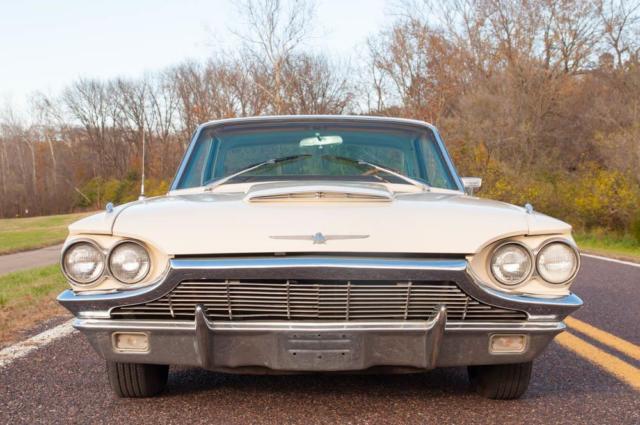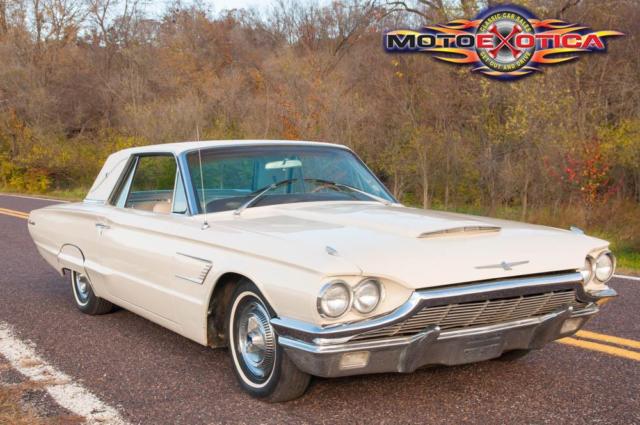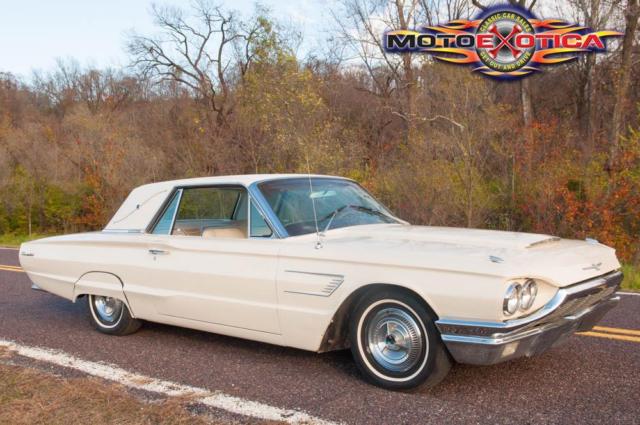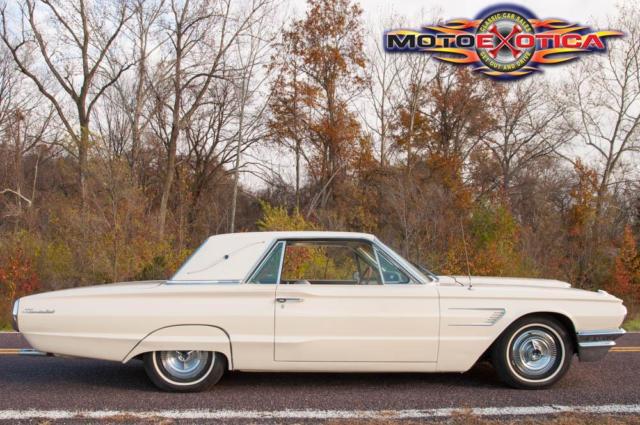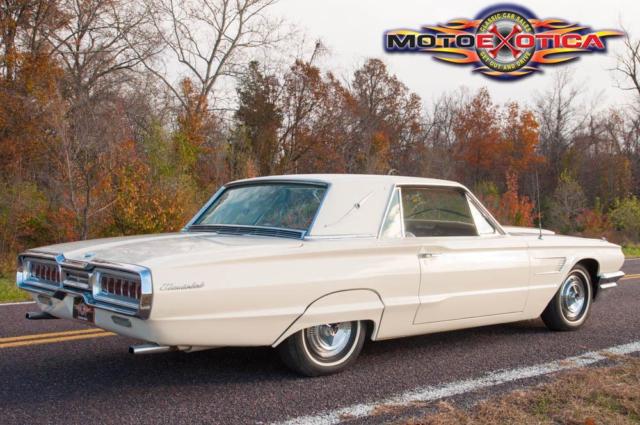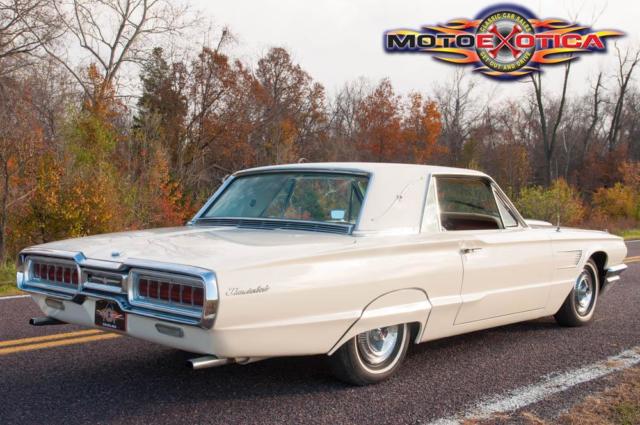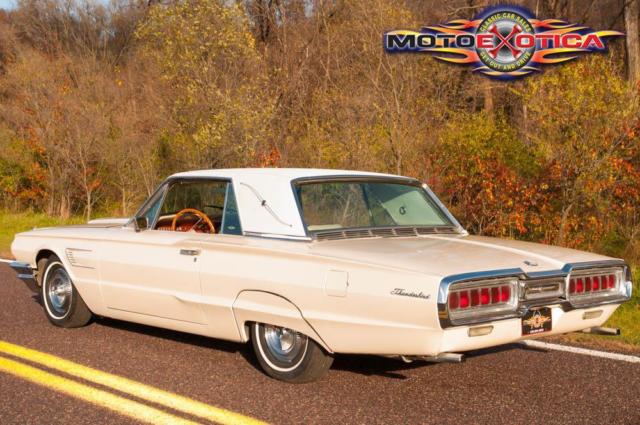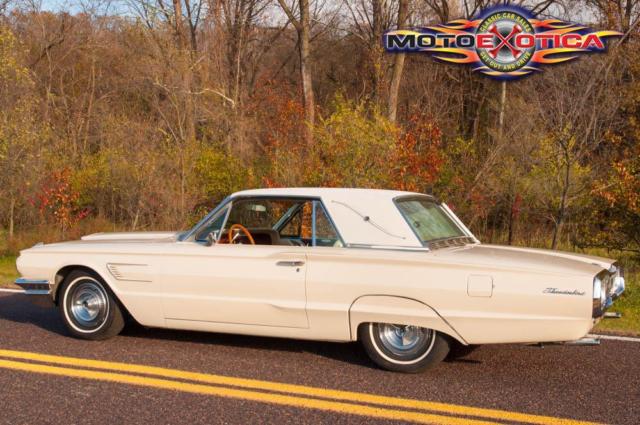1965 Ford Thunderbird Thunderbird Special Landau
- Price:
- Location: Local pick-up only
- Condition: Used
- Make: Ford
- Model: Thunderbird
- SubModel: Thunderbird Special Landau
- Type: Convertible
- Trim: Thunderbird Special Landau
- Year: 1965
- Mileage: 49,422
- VIN: 5Y87Z157737
- Color: White
- Engine size: 390
- Power options: --
- Fuel: Gasoline
- Transmission: Automatic
- Drive type: Convertible
- Interior color: Parchment
- Options: --
- Vehicle Title: Clear
1965 Ford Thunderbird Thunderbird Special Landau Description
Original owner was LaVerne Hoover, plus two other owners, including a man named James BondPrevious owner drove the car for 18 years!
Z code 390 CID V-8 engine with an Edelbrock carburetor
Rebuilt Cruise-O-Matic MX three-speed automatic transmission and a 3.00 rear end
Wimbledon White exterior (approximately five percent of Special Landau T-Birds left the factory in this color)
Ember-Glo accents with Parchment vinyl interior and matching vinyl Landau roof
Car has following new parts - vacuum lines, rear differential, fuel pump, water pump, shock absorbers, rear leaf springs and tires, a rebuilt radiator and upgraded pointless ignition
Rebuilt air conditioning
Swing-away steering wheel
First year for standard front disc brakes, sequential rear turn signals and double-edged car keys
Dual exhausts
Documentation includes original owner’s manual, Edelbrock carburetor owner’s manual and California registration card plus repair tickets for the water pump and rear differential work, fuel pump, radiator and associated parts and other assorted documents
This car was built in Ford’s Wixom, Michigan assembly plant on April 5, 1965 and shipped to Los Angeles, California. This T-Bird spent most of its life in dry California and Arizona. It is believed to have just more than 49,000 original miles on the clock.
The Thunderbird Special Landau was introduced in spring 1965 and differed from the regular Landau due to its unique combination of interior and exterior colors, as well as differences in trim. All Special Landau models were equipped with a Special Parchment-colored vinyl roof, and a matching interior. Special touches included Ember-Glo accents on interior instrument panel, bucket seat backs and carpeting. Emberglo was used on unique Special Landau deluxe wheel covers, (Ford part number C5SZ 1130-C), which were standard on this model and not available on other models, in place of the traditional black-painted vanes. The center medallion of the wheel cover, normally decorated with red, white and blue accents surrounding a chrome Thunderbird emblem on a black background, was instead Emberglo, white and blue. The three "THUNDERBIRD" stamped lettering areas on the wheel cover retained their usual "dull black" color. (Dull black is shinier than flat black, but not as shiny as satin black.)
The roof rear exterior quarter moldings had a nameplate mounted on them with a gold-colored Thunderbird emblem, and "Special Landau" engraved on it. The interior simulated woodgrain trim was of "burled walnut," a different pattern not used on the standard Landau models, and Special Landau nameplates mounted on the front door trim panels reminded occupants they were in something special. A few of these cars were delivered from the factory with Wimbledon White paint adorning the bodies, instead of the more usual Emberglo metallic.
Another exclusive part of the Special Landau was a personalized limited edition numbered nameplate, upon which the owner's name could be engraved. Facts vary somewhat as to how this plate was engraved with the owner's name and attached to the car. One account is that this plate was delivered with the car in an envelope inside the glove compartment. The dealer would make arrangements for the engraving of the owner's name, if the owner desired. Affixed to the console with a double-sided foam adhesive strip, normal placement was just above the radio. The television advertisement announcing this new model showed the plate attached to the console in the area where the air conditioning vents would be located on cars equipped with Select-Aire. The plate featured a beveled edge with a small cast Thunderbird emblem on its left side. This emblem was a small version of the roof sail panel emblem first introduced on the 1964 Thunderbird Hardtop models. At the bottom of the plate the notation "SPECIAL LANDAU LIMITED EDITION No." was engraved, followed by the production sequence serial number of 1 to 4,500. In reality, the numbers on the plates did not always correspond to the build sequence of the car VIN number. Offset to the center right area of the plate would appear the owner's name in capital letters using the same type font as that on the nameplates available for all of the other Thunderbird models.
This car’s Wimbledon White paint has had a recent repaint but there are a few minor blemishes at its nose. Its glass panels are in good condition, clear and crack-free. The car’s lights are in very good order while the car rolls on 205/75R15 tires on steel wheels with Ember-Glo wheels covers. Its body panels are straight and its bumpers are in good shape. The car has dual exhausts and optional rear fender skirts.
Under the hood is Ford’s 390 CID V-8 with an Edelbrock carburetor, attached to a rebuilt Cruise-O-Matic MX three-speed automatic transmission with less than 1,000 miles added since rebuild and a new rear differential (with less than 1,500 miles) with 3.00 gearing and dual exhausts. The car has the following additional new parts – vacuum lines, fuel pump, water pump, shock absorbers, rear leaf springs and tires. The radiator has been rebuilt and the ignition upgraded to pointless. Its air conditioning was rebuilt around 2006.
Inside, the Parchment front bucket and rear bench seats are in good shape, as is the black carpeting and white headliner. The instrument panel is in fair condition and it has two cracks in it, one on the driver’s side and the other on the passenger’s side. The two-spoke steering wheel with rim cover has Ford’s distinctive Swing-Away column, permitting easier ingress and egress from the driver’s seat. The door panels are in fair condition, while the car’s mirrors, center console and gearshift lever are all in good order. Completing the interior is a non-working factory AM radio in the dashboard and a JVC AM/FM stereo with cassette deck mounted under the dash.
The Swing-Away Steering Wheel was a new option introduced on the 1961 Ford Thunderbird. Priced at $25.10, it was a special steering column that moved to the right about 10.5 inches to allow for easier entry and exit for the driver, especially with a purse, briefcase, or packages in tow. On this design, the steering column itself moved and a special metal plate on the instrument panel to the right of the steering column filled the gap when the steering wheel was in the normal drive position and a color-keyed vinyl panel filled the gap on the left side of the column when it had been moved aside.
The car could be started with the steering wheel in either position, but for safety's sake, the transmission could not be shifted out of park until the column had been moved back to normal driving position. And for the same reason, the steering wheel was securely locked in place for driving except for when the transmission shifter was in park.
Despite its popularity on the Thunderbird, this did not carry over to the other Fords and cars with this option are somewhat rare.
Several features intended for the fourth-generation T-Bird were delayed until 1965, when front disc brakes became standard equipment and sequential turn signals, which flashed three bulbs in the broad, horizontal taillights from inside to outside were added; the latter had been delayed by vehicle lighting regulations in U.S. states. Exterior trim was revised, including a new grille and Thunderbird emblem replacing the block letters on the front edge of the hood, simulated front fender vent trim, revised Thunderbird scripts now located on the rear edge of the quarter panels and revised taillight lens trim and center emblem replacing the lens Birds and block letters, respectively.
Documentation includes original owner’s manual, Edelbrock carburetor owner’s manual and California registration card plus repair tickets for the water pump and rear differential work, fuel pump, radiator and associated parts and other assorted documents.
More Ford classic cars for sale
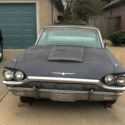 1965 Ford Thunderbird Landau Special
1965 Ford Thunderbird Landau Special
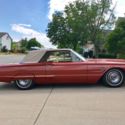 1965 Ford Thunderbird Special Landau
1965 Ford Thunderbird Special Landau
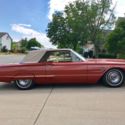 1965 Ford Thunderbird Special Landau | NO RESERVE
1965 Ford Thunderbird Special Landau | NO RESERVE
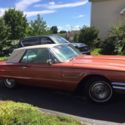 1965 Ford Thunderbird Landau special Edition
1965 Ford Thunderbird Landau special Edition
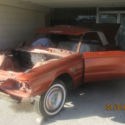 1965 Ford Thunderbird Special Landau PROJECT CAR
1965 Ford Thunderbird Special Landau PROJECT CAR
 1965 Ford Thunderbird Special Edition Landau
1965 Ford Thunderbird Special Edition Landau
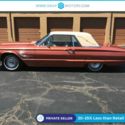 1965 Ford Thunderbird Special Landau Edition
1965 Ford Thunderbird Special Landau Edition
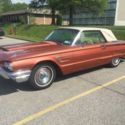 1965 Thunderbird Special Landau Edition With Landau Roof
1965 Thunderbird Special Landau Edition With Landau Roof
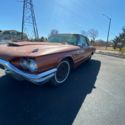 1965 Ford Thunderbird Special Landau 2 door, 390 v8, factory a/c
1965 Ford Thunderbird Special Landau 2 door, 390 v8, factory a/c
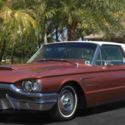 1965 Ford Thunderbird Landau Special Edition 22,600 miles
1965 Ford Thunderbird Landau Special Edition 22,600 miles
 1965 Ford Thunderbird Landau Special
1965 Ford Thunderbird Landau Special
Year: 1965
Mileage: 100
Mileage: 100
 1965 Ford Thunderbird Special Landau
1965 Ford Thunderbird Special Landau
Year: 1965
Mileage: 10,000
Mileage: 10,000
 1965 Ford Thunderbird Special Landau | NO RESERVE
1965 Ford Thunderbird Special Landau | NO RESERVE
Year: 1965
Mileage: 10,000
Mileage: 10,000
 1965 Ford Thunderbird Landau special Edition
1965 Ford Thunderbird Landau special Edition
Year: 1965
 1965 Ford Thunderbird Special Landau PROJECT CAR
1965 Ford Thunderbird Special Landau PROJECT CAR
Year: 1965
Mileage: 55,000
Mileage: 55,000
 1965 Ford Thunderbird Special Edition Landau
1965 Ford Thunderbird Special Edition Landau
Year: 1965
Mileage: 23400
Mileage: 23400
 1965 Ford Thunderbird Special Landau Edition
1965 Ford Thunderbird Special Landau Edition
Year: 1965
Mileage: 67722
Mileage: 67722
 1965 Thunderbird Special Landau Edition With Landau Roof
1965 Thunderbird Special Landau Edition With Landau Roof
Year: 1965
Mileage: 76,000
Mileage: 76,000
 1965 Ford Thunderbird Special Landau 2 door, 390 v8, factory a/c
1965 Ford Thunderbird Special Landau 2 door, 390 v8, factory a/c
Year: 1965
Mileage: 106000
Mileage: 106000
 1965 Ford Thunderbird Landau Special Edition 22,600 miles
1965 Ford Thunderbird Landau Special Edition 22,600 miles
Year: 1965
Mileage: 22,600
Mileage: 22,600

